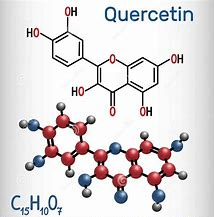Quercetin is a natural compound found in a variety of plant-based foods, including fruits, vegetables, and grains. It belongs to a class of compounds known as flavonoids, which are known for their antioxidant and anti-inflammatory properties. Quercetin has been studied extensively for its potential health benefits, including its ability to support immune function, reduce inflammation, and improve cardiovascular health.

Immune System Support
One of the most well-known benefits of quercetin is its ability to support immune function. Quercetin has been shown to have a direct antiviral effect on several different viruses, including the flu virus, herpes simplex virus, and the coronavirus that causes SARS. In addition, quercetin has been shown to enhance the immune system’s ability to fight off infections by stimulating the production of white blood cells.
Several studies have investigated the potential of quercetin to prevent respiratory infections, particularly the common cold. A review of 10 studies found that quercetin supplementation was associated with a reduced incidence of respiratory infections and a shorter duration of symptoms in people with upper respiratory tract infections.
Anti-Inflammatory Properties
Quercetin is also known for its anti-inflammatory properties. Inflammation is a natural response of the immune system to injury or infection, but chronic inflammation can contribute to the development of a variety of health problems, including arthritis, heart disease, and cancer.
Quercetin has been shown to inhibit the production of inflammatory molecules in the body, including cytokines and histamine. In addition, quercetin has been shown to inhibit the activity of enzymes that contribute to the development of inflammation.
Several studies have investigated the potential of quercetin to reduce inflammation and improve symptoms in people with inflammatory conditions such as arthritis. A study published in the Journal of the American College of Nutrition found that quercetin supplementation reduced inflammation and improved symptoms in people with rheumatoid arthritis.
Cardiovascular Health
Quercetin may also have benefits for cardiovascular health. The antioxidant and anti-inflammatory properties of quercetin may help reduce the risk of heart disease by improving the health of the blood vessels and reducing inflammation in the body.
Several studies have investigated the potential of quercetin to reduce blood pressure, a major risk factor for heart disease. A study published in the British Journal of Nutrition found that quercetin supplementation reduced blood pressure in people with hypertension.
Quercetin may also help improve cholesterol levels by reducing LDL cholesterol levels, which is a major risk factor for heart disease. A study published in the Journal of Nutrition found that quercetin supplementation reduced LDL cholesterol levels in overweight and obese women.
Other Potential Benefits
In addition to its well-known health benefits, quercetin may have other potential benefits as well. For example, quercetin has been shown to have anti-cancer properties by inhibiting the growth and spread of cancer cells.
Quercetin may also have benefits for cognitive function by improving blood flow to the brain and reducing inflammation in the brain. A study published in the Journal of Psychopharmacology found that quercetin supplementation improved cognitive performance in healthy young adults.
Conclusion
Quercetin is a natural compound with a variety of potential health benefits. Its ability to support immune function, reduce inflammation, and improve cardiovascular health make it a promising supplement for a wide range of health conditions. While more research is needed to fully understand the potential benefits of quercetin, the available evidence suggests that it is a safe and effective supplement for improving overall health and well-being.
